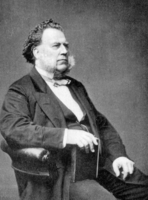Andrew Miller
Author Index
 ANDREW
MILLER was born in the village of Kilmaurs, Ayrshire, on 27th January,
1810. As a young man he entered the firm of Smith, Anderson & Co.,
Glasgow, eventually taking up the London Branch of the firm, afterwards
changed into Miller, Son & Torrance, of Cannon Street.
ANDREW
MILLER was born in the village of Kilmaurs, Ayrshire, on 27th January,
1810. As a young man he entered the firm of Smith, Anderson & Co.,
Glasgow, eventually taking up the London Branch of the firm, afterwards
changed into Miller, Son & Torrance, of Cannon Street.
While supervising a large London business, Mr. Miller was for a
considerable time the voluntary pastor of a Baptist Church. As light from
the Word of God was followed the sectarian principles were left behind,
and the believers gathered on Scriptural lines; Mr. Miller continuing to
labour as an honoured brother amongst them.
As a warm-hearted Evangelist, the best of the man was ever visible. He
was greatly used in the conversion of souls, both amongst old and young.
It was no uncommon thing for the preacher to bathe his impassioned appeals
with tears while he pleaded the claims of the Master he loved. In fact, he
was called by many "the Rutherford of brethren."
As an author his name will be remembered as long as his valuable "Papers
on Church History"* or his Meditations on the Song of Solomon,
on the Psalms, and other themes continue to be read. If they were more
known they would be more valued. He encouraged the writing, wrote the
introduction, and largely helped to finance the issues of
C.H.M.´s "Notes on the
Pentateuch", the most popular and extensively circulated of all the
varied volumes connected with what is known as "the Brethren movement".
Telling how he had been led to cast in his lot with those who thus
gather to the Name of the Lord Jesus, and to break bread every Lord´s
day, he said he had been a member of a Church for some time previously,
when one day he was invited by a Christian gentleman to attend a Bible
reading which was held in his drawing-room each week.
"I accepted the invitation" he said, "and went, but
such a stranger was I to that kind of thing that I went in full evening
dress, and found myself the only one so attired, which made me feel very
uncomfortable. We were invited into the dining-room for refreshments,
and then adjourned to the drawing-room for the Bible reading. After
prayer a passage of Scripture was reverently read, and a deeply
interesting conversation followed. As I listened to the unfolding of the
Inspired Volume I began to discover that the Bible contained such
wonderful truths, to which I was an entire stranger, that I soon forgot
my evening dress and made up my mind to attend the next weekly Bible
reading if the host would invite me. This he did, and I attended week by
week, learning more and more the wonderful truths of God, and becoming
better acquainted with the great purposes of redeeming love and grace.
Thus I was led to cast in my lot with the so-called ´brethren´."
On another occasion he told how he was led to begin to preach and to
speak publicly. Having to visit the North of Ireland in connection with
business matters during the Revival of 1859-60, he had been an eye-witness
of some of those wondrous scenes of spiritual blessing when many men and
women were stricken down to the ground under the convicting power of God´s
Word, and were constrained to cry out publicly for mercy. Souls were
saved, backsliders were restored, and believers were revived and blessed.
On returning to London, Mr. Miller could not help but tell his friends
what he had seen and heard. These friends at once said:
"We must not keep these good things to ourselves, but we must
invite our friends and neighbours together that they also may hear of
this marvellous work of grace."
Drawing-room meetings were convened, and Mr. Miller was invited to give
an account of the Revival work in the North of Ireland. In this way he was
led out into public service for his Lord.
He had a passion for souls, and was a true Evangelist, as well as a
spiritually qualified teacher. He saw the multitude, and his soul was
stirred. Rarely ever did he preach the Gospel without tears, and he told
me how it grieved him to his heart to find the growing apathy in Gospel
work among the saints in the different assemblies he visited.
In labours more abundant for half a century, in suffering scarcely less
so near the end, Andrew Miller fell asleep on 8th May, 1883. In the
eventide of retirement, as he looked back upon the past, around on the
then present, and forward to the future, he exclaimed with great emphasis
of soul, "Nothing counts but Christ."
G.H.
*Currently published by Bible Truth Publishers
Extracted from ´Chief Men among the brethren´ Pub. Pickering
& Inglis
Author Index
 ANDREW
MILLER was born in the village of Kilmaurs, Ayrshire, on 27th January,
1810. As a young man he entered the firm of Smith, Anderson & Co.,
Glasgow, eventually taking up the London Branch of the firm, afterwards
changed into Miller, Son & Torrance, of Cannon Street.
ANDREW
MILLER was born in the village of Kilmaurs, Ayrshire, on 27th January,
1810. As a young man he entered the firm of Smith, Anderson & Co.,
Glasgow, eventually taking up the London Branch of the firm, afterwards
changed into Miller, Son & Torrance, of Cannon Street.